Stay always informed
Interested in our articles? Get the latest information and analysis straight to your email. Sign up for our newsletter.

[Photo: Bianka Csenki/Artivists Collective - climate justice leaders denounce the influence of Big Polluters to the media at COP28]
Despite the hailed deal to “transition away from fossil fuels”, the 2023 UN climate summit’s text has the oily fingerprints of the fossil fuel lobby all over it. The reality is COP28 is more likely to facilitate a fossil fuel frenzy by cementing false solutions in the text: exactly what the army of lobbyists ordered.
The COP28 agreement to “transition away” from fossil fuels was historic. Believe it or not, this is the first time fossil fuels – all fossil fuels – were explicitly included in a UN climate change text in over 28 years of negotiating.
Governments, scientists, and campaigners had pushed for a “phase-out” of fossil fuels to maintain the slim hope of keeping average global temperature rise below 1.5oc. But given the COP28 President was an oil executive with the industry taking centre-stage, achieving this was more than some expected.
However, a look beneath the top-line takeaway reveals a “litany of loopholes” as small island states put it.
In fact, COP28’s outcome, known as the “UAE Consensus”, was exactly what the fossil fuel industry ordered: an opportunity to rehabilitate its role in the fight against climate change while shifting the terms of the debate away from the elimination of oil and gas towards a mere reduction in emissions thanks to its techno-fix distractions like carbon, capture and storage (CCS) and hydrogen.
And the European Union, while presenting itself as a climate saviour via new Commissioner Hoekstra, put the interests of its own industries – fossil or otherwise – first, at the expense of those countries who did the least to create the ongoing climate catastrophe.
Fossil fuels centre-stage
The talks in Dubai were dominated by fossil fuels long before they’d begun on 30 November. Outrage surrounded the appointment of the chief executive of Abu Dhabi National Oil Company (Adnoc), Al Jaber, as COP28 President. Adnoc, already one of the world’s biggest emitters, intends to ramp up its oil and gas production by 2030. Days before the summit kicked off, the BBC reported the UAE planned to use the talks to make oil and gas deals.
As week one began, the Kick Big Polluters Out coalition revealed almost four times as many fossil fuel lobbyists were at COP28 compared to the previous year. The 2456 lobbyists outnumbered the delegations of the 10 most climate vulnerable nations combined, and dwarfed the official indigenous delegation seven-to-one.
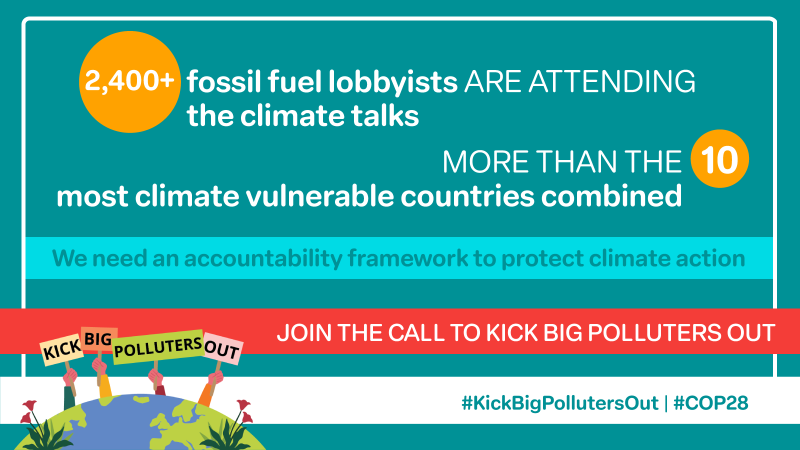
The five oil and gas supermajors – BP, Shell, TotalEnergies, ExxonMobil, and Chevron – together brought 65 lobbyists, with all except Chevron bringing their chief executives. Italian Eni and Norwegian Equinor also ensured their top execs were present, attending as part of very large lobby teams (24 and 14 staff respectively).
Norway’s government had already publicly announced it was inviting oil and gas major Equinor to the talks, but it was worrying to see just how many high-level lobbyists were brought to COP28 by European governments and the EU Commission itself. This included the chief executives of Italian Eni, French TotalEnergies, and Belgian gas transporter Fluxys.
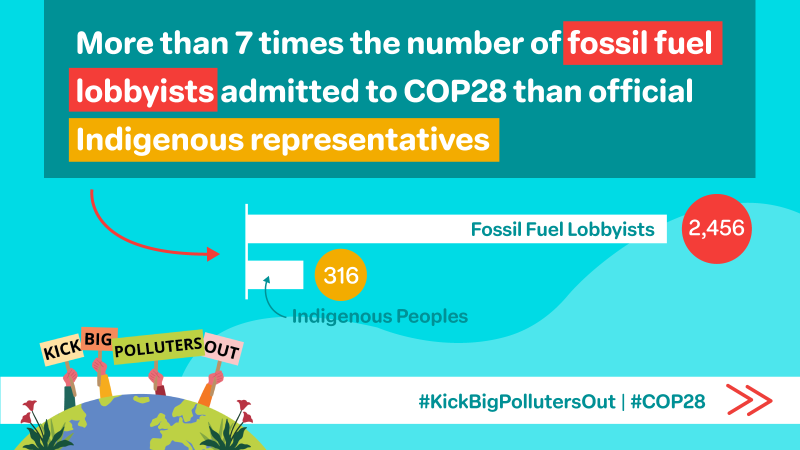
The European Commission provided access to ExxonMobil’s top EU lobbyist, Nikolaas Baeckelmans, into the talks, despite Exxon currently suing the Commission for introducing a windfall tax.
The industry was there primarily to rehabilitate its image as a climate wrecker and reposition itself as part of the solution. Key to this was the Oil and Gas Decarbonization Charter, championed by Al Jaber and signed by 50 industry executives.
They all pledged to reach net-zero by 2050 for their “operations,” but not the emissions from their core product. That would allow increased oil and gas production, so long as the drilling rigs were solar-powered. It felt like the clock had been rolled back ten years, and not for the last time.
“Do you really think Shell or Chevron or ExxonMobil are sending lobbyists to passively observe these talks?” asked Alexia Leclercq from Start:Empowerment, a member of the Kick Big Polluters Out coalition, in response to the record number of fossil fuel lobbyists at COP28: “Big Polluters’ poisonous presence has bogged us down for years, keeping us from advancing the pathways needed to keep fossil fuels in the ground. They are the reason COP28 is clouded in a fog of climate denial, not climate reality.”
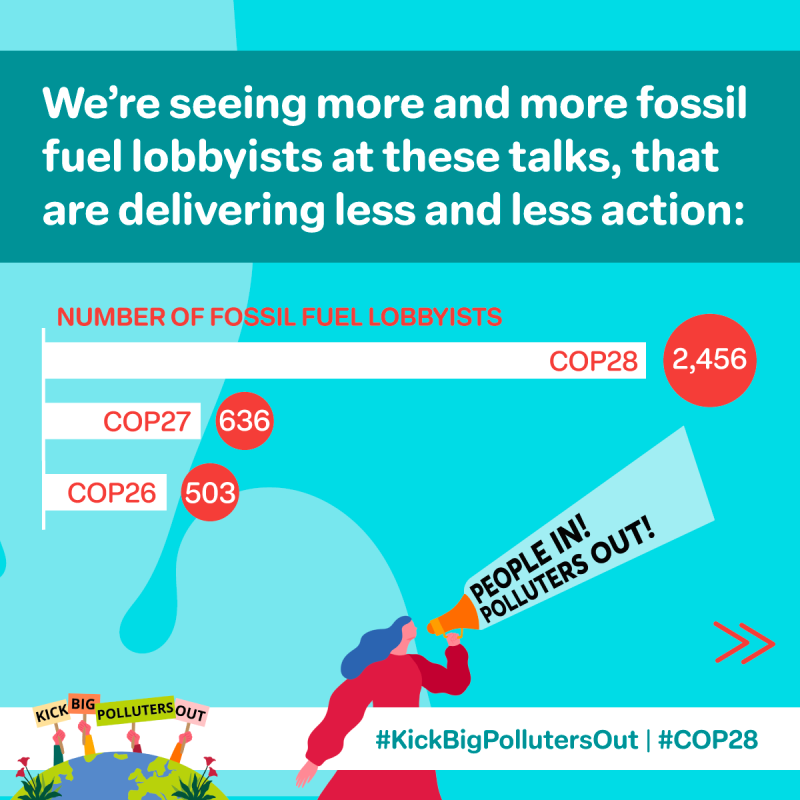
Litany of oily loopholes
The words “transitioning away from fossil fuels” are being lauded as historic, a step beyond calling for the “phase-down” of unabated coal we heard at COPs 26 and 27, heralding the “end of the fossil fuels era,” according to German foreign minister Annalena Baerbock.
So why are oil and gas majors Equinor and Shell supportive of the outcome? In part because there is no definition of what a transition means and no timeline.
Also included in the text is a reference to “transitional fuels”: industry speak for rebranding gas as a “bridge” towards renewables rather than a fossil fuel as bad for the climate as coal. Arguments that have been thoroughly debunked – hence industry’s shift towards hydrogen – but are now back with a vengeance following Russia’s invasion of Ukraine last year and the focus on energy security.
UK climate Minister Graham Stuart, even told the BBC that new licences for oil and gas drilling in the North Sea were “absolutely a transition away from fossil fuels”.
The text also explicitly supports “zero- and low-emission technologies”, name checking “carbon capture and utilisation and storage” (CCUS) and “low-carbon hydrogen”. Both underpin the fossil fuel industry’s current rebranding tactic, shifting focus from leaving fossil fuels in the ground to technologies that can reduce their emissions.
This shift allows the likes of BP and Shell to keep selling oil and gas while simultaneously capitalising on so-called “low carbon” technologies and products. A win-win – unless you’re anyone other than a fossil fuel lobbyist. Both have been heavily supported – politically and financially – in the US and EU.
False solutions flood the COP
Carbon capture and storage (CCS) has been around for decades, with industry claiming it can capture fossil fuel emissions from power plants or industry and bury them underground – or ‘use’ them (hence CCUS). Except it’s never been effective or commercially viable. Yet of the tiny quantity of CO2 that is captured, almost 80 per cent of it is ‘used’ to extract more fossil fuels, pumped into oil fields to ‘enhance oil recovery’ (EOR).
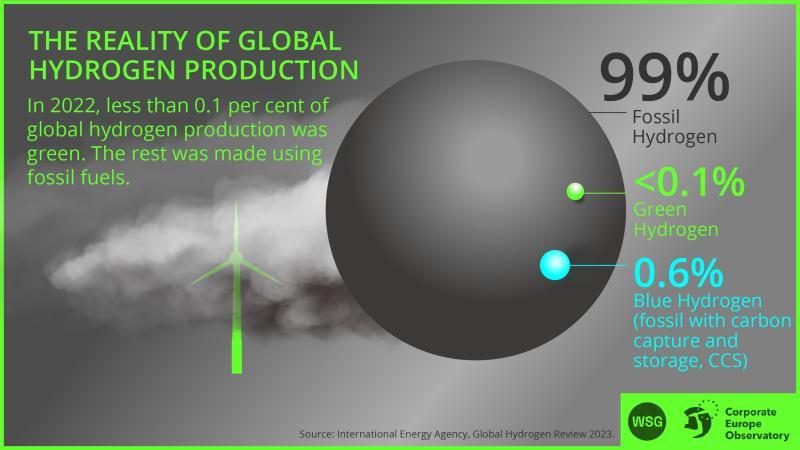
Hydrogen is touted as the latest silver bullet to replace fossil fuels, as it is possible to create it from water using renewable electricity. However, 99 per cent of hydrogen used today is made from fossil fuels, with the vast majority coming from unabated gas.
Industry claims that by applying CCUS, it can create “low-carbon hydrogen” and therefore keep pumping gas. Another reason to lobby for CCUS, even if research shows “low-carbon hydrogen” produces 20 per cent more emissions than sticking to gas.
Both CCUS and hydrogen were mainstays at COP28. According to an investigation by CIEL, there were 475 CCUS lobbyists at the COP including Darren Woods, the chief executive of ExxonMobil, a corporation that markets itself as a “global leader in carbon capture and storage.”
Numerous side events were organised over the two weeks by industry lobby groups like the Global CCS Institute, as well as by reputable institutions like the International Energy Agency and the European Investment Bank.
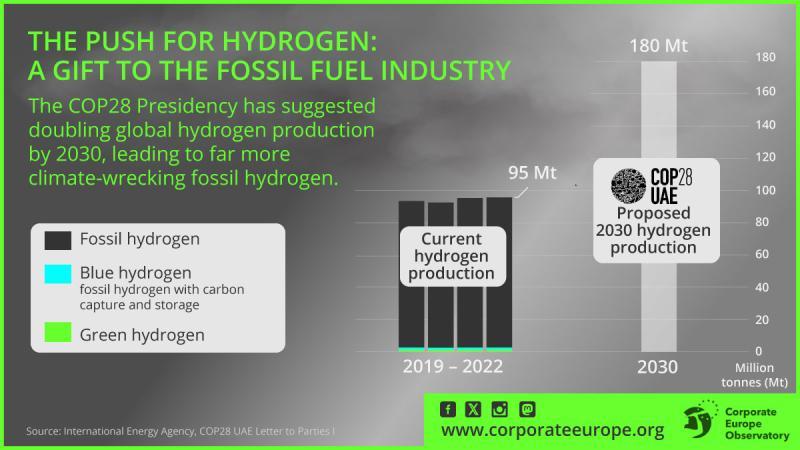
Hydrogen was always going to be big. COP28 President Al Jaber initially pushed for a global target of doubling hydrogen production, alongside the global renewables and efficiency targets. The COP28 agreement does not mention a concrete hydrogen target, but includes it as an explicit route to “transition away from fossil fuels”, providing a substantial boost for the industry promoting it.
As revealed by Corporate Europe Observatory, the oil and gas industry, with ample help from numerous global consultancies, laid the groundwork for such an outcome. At COP there were numerous high-level events for ministers, executives, and policy-makers before and during the talks, organised by UAE, its army of consultants and the hydrogen lobby.
On 5th December the High Level Roundtable on Hydrogen, for ministers and chief executives, launched numerous initiatives “designed to accelerate commercialisation of hydrogen projects.” A deal was announced later that day between Al Jaber’s Adnoc and Socar, the national oil company of Azerbaijan, who will host COP29, on “low-carbon hydrogen,” a life-line to the oil and gas industry.
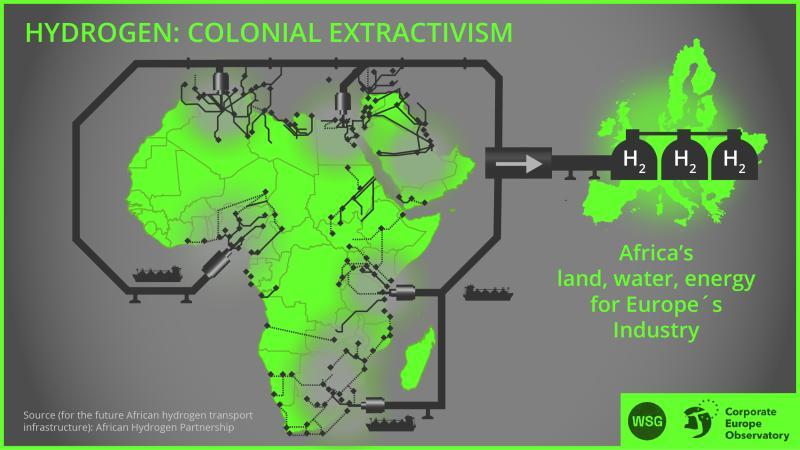
COP28 was also inundated with renewable hydrogen initiatives, many involving the EU, such as the Africa-EU Green Energy Initiative. But as Corporate Europe Observatory and others have shown, these projects also come with serious concerns, including human rights abuses, land grabbing and resource extractivism, exacerbating the same neocolonial relationships that underpin today's fossil-fuelled energy model.
EU Commissioner and McKinsey
A big question mark hung over the head of newly-appointed Climate Commissioner Wopke Hoekstra as he headed to COP28. Was he fit for the job? Did working for over a decade for McKinsey, which has been advising the COP28 President in the interests of the fossil fuel industry, compromise his independence and integrity? These concerns were exacerbated given he had not disclosed who his clients were while at the consultancy, despite telling the European Parliament he would.
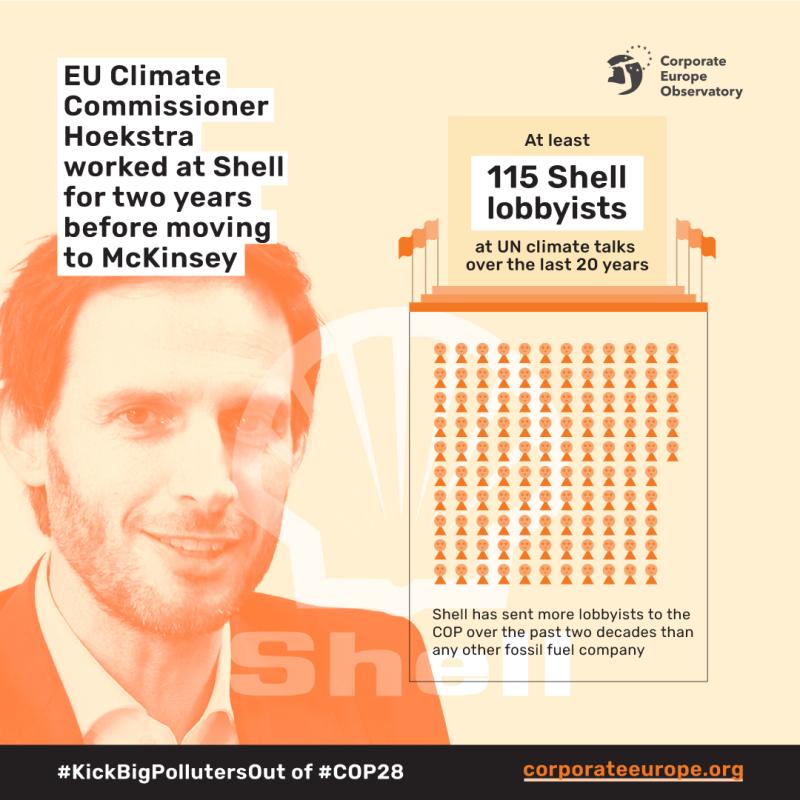
The day the UN talks started, Hoekstra, who began his career at Shell, wrote to Members of the European Parliament (MEPs). He confirmed that he hadn’t worked for any oil company or fossil fuel company but that McKinsey would not allow him to disclose his clients. Even if not working directly for the industry, Hoekstra was at the firm for 11 years, including five as partner, meaning a senior role and close relationships across the organisation.
His current role is surely of interest to current McKinsey clients. Eric Wiebes, a fellow Shell and McKinsey alumni who also served alongside Hoekstra as a minister for four years, is now back with McKinsey Netherlands as a senior partner and promoting hydrogen with CCS.
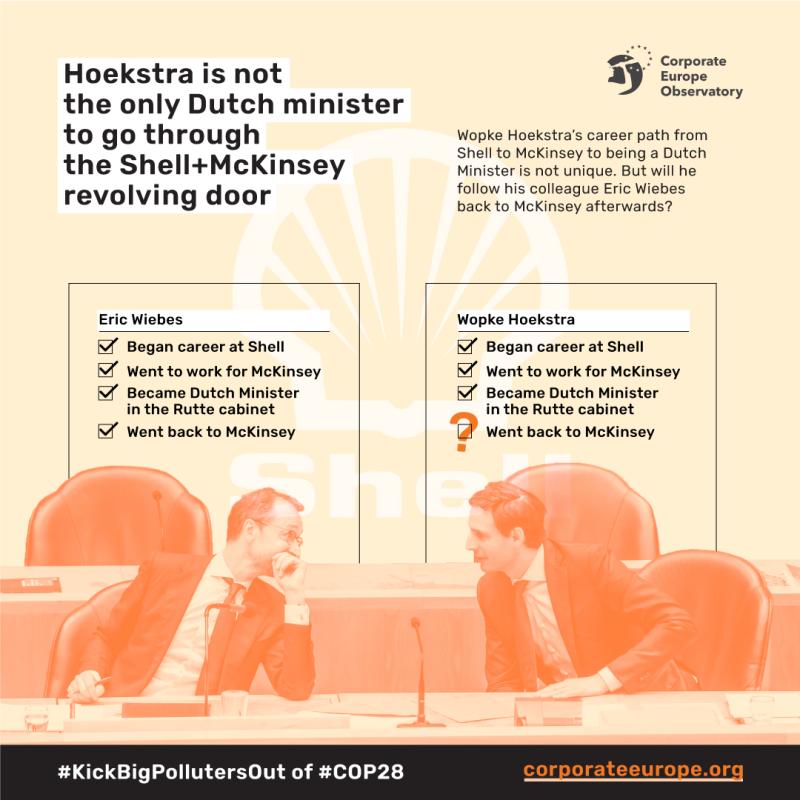
At COP28, McKinsey had over 50 staff members. More than half were brought in by the host country, UAE. And its fossil fuel clients were also out in force. Although the consultancy firm remains tight-lipped over its clients, it boasts of advising “55 percent of the world’s top 20 oil and gas companies” over the past five years. The ten major fossil fuel companies publicly known to have been McKinsey clients, including BP, ExxonMobil, Chevron, and Chevron, brought more than 90 lobbyists to COP28.
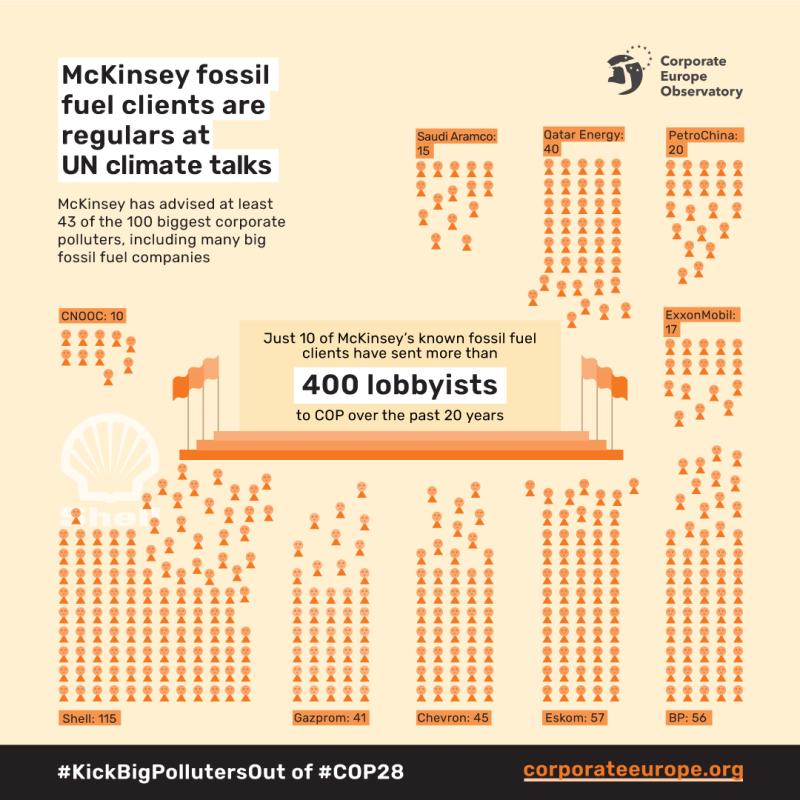
EU in solidarity or self-interest?
At COP28, Hoekstra and the EU were determined to present themselves as climate champions. They strongly backed a fossil fuel phase-out, as well as a global target to triple renewables and energy efficiency by 2030.
In Hoekstra’s final speech to the plenary he celebrated the “beginning of the end of fossil fuels”. Yet what did these targets mean for countries in the global south who had done the least to cause climate change? According to Power Shift Africa’s Mohamed Adow, a long-time COP-watcher, the proposed transition away from fossil fuels “is not funded or fair”.
As a historic emitter whose economic development has been premised on burning fossil fuels and causing global heating, the EU has a responsibility enshrined in consecutive UN climate treaties to lead on cutting its own emissions while providing technology and finance to help others to develop without relying on fossil fuels.
According to those on the ground, the EU did not provide the finance or technology (the “means of implementation”), while actively blocking long-term finance for countries already hit by climate impacts (known as ‘Loss and Damage’).
Therefore it was ironic to hear Hoekstra address his final words to COP28 to “friends around the world that need our help, the islands in particular”, telling them the EU “will stand with you”.
Climate justice groups present in Dubai called for a “fast, fair, funded, false solutions-free fossil fuel phase out — of all fossil fuels — alongside the needed finance and technology for implementation,” while lamenting that “a phaseout is useless without the tools needed to actually achieve it.”
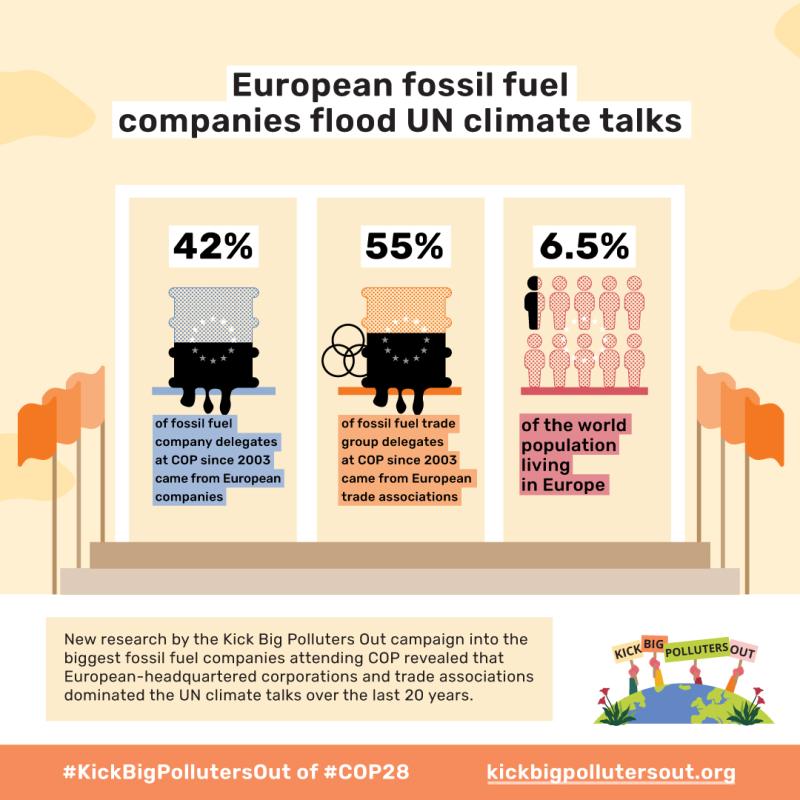
By not providing those tools, Hoekstra and the EU are undermining their own professed goals. Viewed cynically, it also allows European companies to benefit, stepping in to provide private finance (via loans or carbon market offset credits), and private technology (via building and operating renewable installations). It also means the EU can influence decarbonisation pathways for its own benefit via development aid e.g. financing export-oriented renewable hydrogen projects, undoubtedly involving European companies, rather than developing locally owned and controlled renewables for energy access.
Shut the door on fossil fuels
Scratch beneath the surface and the heralded ‘historical’ outcome of a “transition away from fossil fuels” at COP28 looks more likely to catalyse a fossil fuel frenzy by cementing the industry’s favourite false solutions in the text. Exactly what their army of lobbyists ordered. Meanwhile the EU, US, and others laud their ambition while ensuring it never materialises at a global level by actually providing the means to deliver said ambition.
If this text has the oily fingerprints of the fossil fuel industry all over it, then removing their grubby hands once and for all should be a priority. In June 2024 negotiators will reconvene in Bonn, Germany for the UN intersessionals before COP29. The topic of conflicts of interest will be firmly on the agenda.
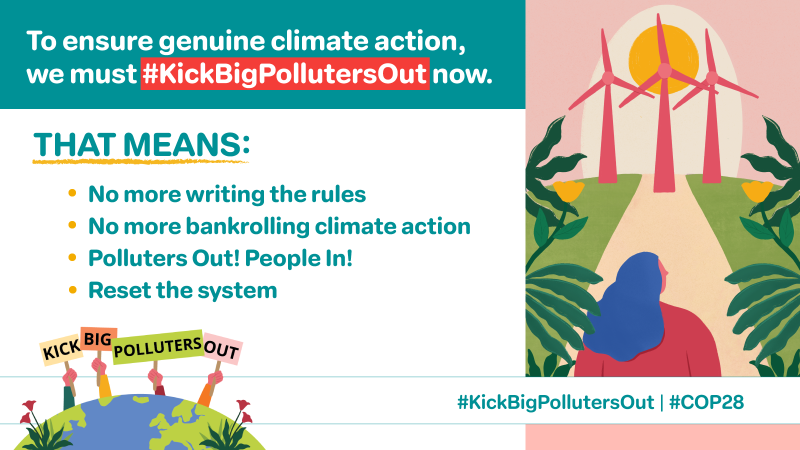
Can the momentum and frustration against the fossil fuels industry at COP28 be used to protect the talks from their presence, as we’ve seen happen to the tobacco industry? The Kick Big Polluters Out campaign will be there to keep the pressure on, and 2024 promises to bring with it a renewed fight and determination.